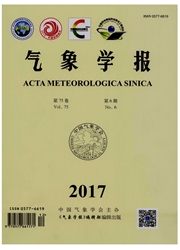

 中文摘要:
中文摘要:
借助ENSEMBLES计划提供的5个海-气耦合模式(CGCM)的多初值后报降水资料,采用常用的4种多模式集合方案,即等权集合(EE)、对单个集合成员先订正再等权集合(Cali—EE)、基于多元线性回归的集合方案(MLR)、基于贝叶斯统计学的集合方案(Bayes),制作1960-2005年中国东部夏季降水概率密度函数(PDF)季度预测。在此基础上,比较最优(技巧最高)集合方案与气候学预测(衡量概率密度函数预测是否有技巧的基准)的技巧,初步评估目前基于多模式集合方案的、中国东部夏季降水的概率密度函数季度预测能力。结果表明,Bayes方案在华南最优,Cali—EE在长江流域、江淮流域以及中国北方的中部最优,MLR在中国北方的东部最优;基于这些最优集合方案的概率密度函数预测产品均具有高校准度,且其锐度高于或接近气候学预测;并且,对于所有区域,最优集合方案的预测技巧总是高于气候学预测,这暗示即使不提取模式其他变量中所包含的预测信息,对于中国东部夏季降水季度预测,常用的多模式集合方案也已具备制作有技巧的概率密度函数预测产品的能力。
 英文摘要:
英文摘要:
Abstract The skill of probability density function (PDF) prediction of summer rainfall over East China is evaluated by skill of optimal ensemble schemes, based on the precipitation data from five coupled atmosphere-ocean general circulation models in ENSEMBLES. The optimal ensemble scheme in each region is the scheme with the highest skill in the four commonly-used ones: the equally-weighted ensemble (EE), EE for calibrated model-simulations (Cali-EE), the ensemble scheme based on multiple linear regression analysis (MLR), and the Bayesian ensemble scheme (Bayes). Results show that the optimal ensemble schemes are the Bayes in the southern part of East China, the Cali-EE in the Yangtze River Valley, the Yangtze-Huaihe River Basin and the central part of northern China, and the MLR in the eastern part of northern China. Their PDF predictions are well calibrated, and are sharper than or have approximately equal interval-width to the climatology prediction. In all regions, these optimal ensemble schemes outperform the climatology prediction, which indicate that current commonly-used multi-model ensemble schemes have been able to produce skillful PDF prediction of summer rainfall over East China, even though more information from other model variables is not derived.
 同期刊论文项目
同期刊论文项目
 同项目期刊论文
同项目期刊论文
 期刊信息
期刊信息
